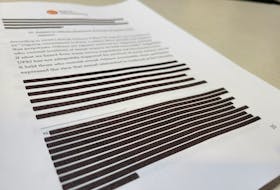BY RICHARD DEATON
GUEST OPINION
Ian Dowbiggin, history professor at UPEI and Fellow of the Royal Society of Canada, has attributed statements to me that I never made or suggested ("Flattering prejudices," Guardian, Nov. 24, 2018). He has taken me out of context, as well as misquoting me. This has not gone unnoticed by others who have brought this matter to my attention.
Readers are invited to compare my original op-ed article ("Toxic Christianity," Guardian, Nov. 22, 2018) with Dowbiggin's false attributions and misleading inferences.
Dowbiggin inaccurately states that, "Deaton says the Bible reminds him of Chairman Mao's Little Red Book." Untrue. What I said, had he read my article, was in specific reference to Ron Jenkins's Guardian letter (Nov. 20, 2018) where he uses the Bible in the same way Mao's Little Red Book was used, that is, for mind-numbing, rigid, textual literalism to provide validation.
RELATED: LETTER: Flattering prejudices
Jenkins's letters over the years about religion demonstrate that inflexible mind set. And my childhood friends remember the rote memorization of the Catholic Catechism. But at no time did I say the Bible reminds me of the Little Red Book.
Furthermore, Dowbiggin states that I have been, "Accusing the Bible of similarities with communist ideology." Really? I did no such thing. I dare Dowbiggin to show Guardian readers where I said this. He can't, because I didn't.
Perhaps Dowbiggin believes that the early Hebrew prophets and their commentaries are "communist ideology"? He obviously has never heard of Dorothy Day's Catholic Workers movement, the Rev. Hewlett Johnson of Canterbury, the 1950s French Workers Priest movement, or Liberation Theology in Latin America during the 1970s.
Dowbiggin seems to have a monolithic view of religion. Why he chooses to distort what I said, says more about him than anything else. He clearly is more interested in pursuing his tiresome McCarthyite red baiting, than dealing with the substantive issues raised. One can only wonder about his biases, especially regarding public policy and medical ethics.
In summary, the main point of my original article was that the history of Christianity, as history, effectively undermines Christian theology. And that the leap from history to theology is based on faith. But faith isn't a substitute for historical evidence or empirical fact.
In recent years biblical scholars and historians, Christian and Jewish, have opened up the field of bible studies using source criticism and textual interpretation employing the tools of historians, linguists and archaeologists. This has led to new interpretations and understanding of both the Old and New Testaments. Biblical literalism is a thing of the past, except for die-hard religious fundamentalists. Both Jenkins and Dowbiggin should open their minds.
- Richard Deaton, Ph.D., LL.B., Stanley Bridge









